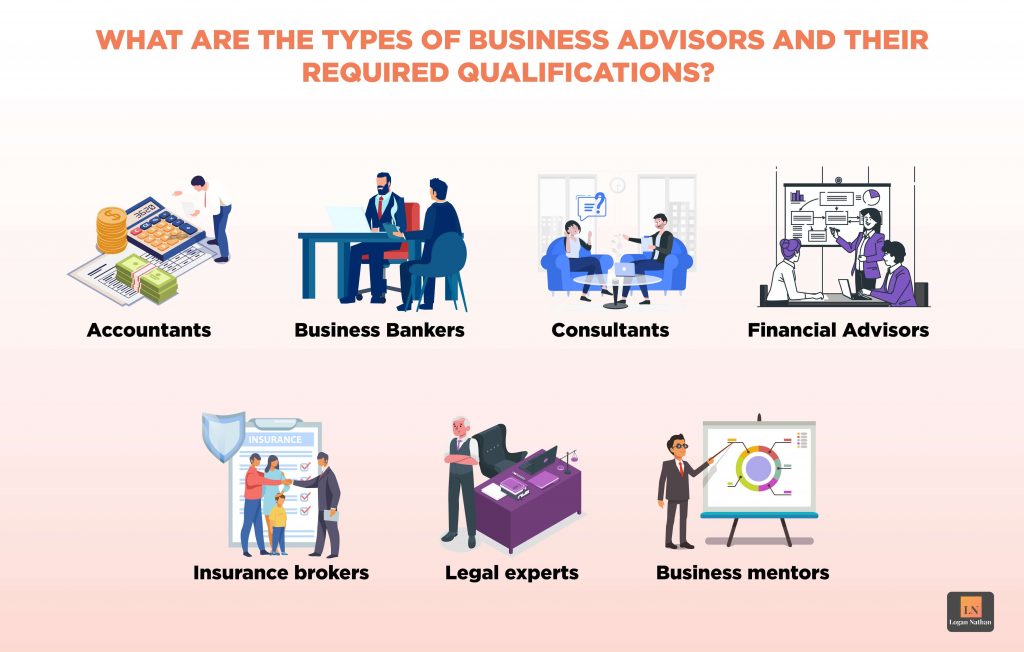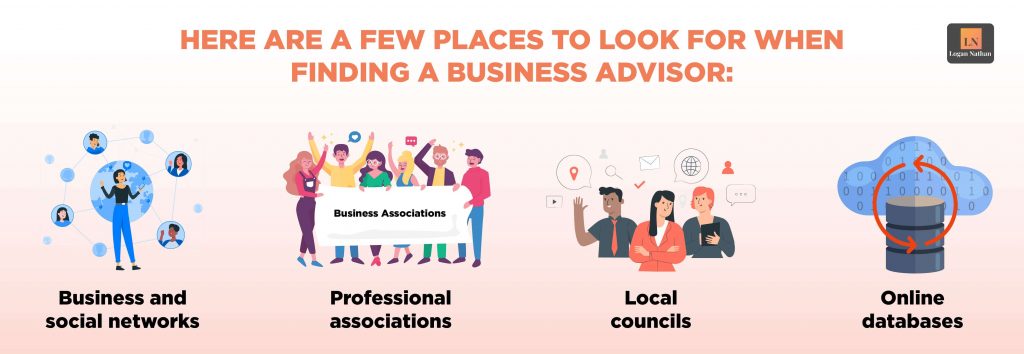Table of Contents
The purpose of this blog is to share with you everything I’ve learned along the way as I searched for a business advisor who was not only the right fit for the company but also helped me stay focused on the long term goal to make the i4T Global brand a globally recognised Field Service Management platform.
If you are just starting your journey to getting to know more about business advisors and how they can benefit your business, here’s everything you need to know.
Who is a business advisor?
Business advisors provide consultancy in one or more specialised niches of their expertise. Generally, they provide the business owners and entrepreneurs with market information and ideas on how to run their business more effectively.
Since some decisions with respect to Financial Effectiveness, Risk Management, Mergers and Acquisitions, New Business Development etc., might be outside the business owner’s core strengths, business advisors can provide valuable input on all such matters no matter which stage the business is going through.
What are the types of business advisors and their required qualifications?
There are different types of business advisors, each of which can help you in a specific area of expertise.
1) Accountants
From starting, growing and closing down your business, as a business owner you would need the help of accounts for everything including tax, income, obligation to employees, managing finances and bookkeeping.
Your accounts should be affiliated to one of the following:
2) Business Bankers
Business bankers are well-equipped to advise you on a variety of banking products to help you with cash flow management, obtaining and paying off loans, payroll systems and investment strategies.
To make sure your business banker is authorised they should be listed at Australian Prudential Regulation Authority’s register of authorised deposit-taking institutions.
3) Consultants
A consultant can provide you advice in their particular field of expertise such as IT, HR, Sales, Marketing or overall business management.
It’s important to do your homework and check reviews before deciding if a consultant is the right fit for your business needs.
4) Financial Advisors
Financial advisors help you with the development of your business’ financial strategy and provide you advice on investing, retirement, superannuation, risk management, insurance, tax and succession planning.
Your financial advisor should hold an Australian Financial Services (AFS) licence.
5) Insurance Brokers
You would need an insurance brokers’ advice in order to manage your business assets, employees and other legal liabilities to carry out your business.
Your insurance broker should hold an Australian Financial Services (AFS) licence.
6) Legal Experts
Legal experts guide business owners on licensing and complying with regulations. They can also help you in understanding and drafting legal contracts. You would need legal advice when selecting a business structure, resolving disputes, filing for bankruptcy and ending your business.
Your legal expert must be a qualified lawyer and hold a current practising certificate.
7) Business Mentors
Think of a business mentor as your advisor, role model, critic and consultant. It can be someone from your family or friends providing informal mentoring or it can be a formal mentor who has industry experience and is part of a related association.
Understanding where you are struggling in your business
While you might be reluctant to invest in getting professional business advice on how to run your business more effectively, in the long run this might prove to be detrimental to business growth and sustainability.
A business advisor helps you understand the areas where your business needs to be improved and further develop on the ones that are already doing well.
BPI or Business Process Improvement is an exercise that your business needs to take on internally by the top management or externally by an independent advisor or analyst to improve efficiency, effectiveness, accuracy and satisfaction of processes that directly or indirectly impact the employee and the customers.
While various techniques and tools are used to identify areas of improvement, process mapping is one way to break down the entire customer journey into individual steps which helps highlight ones that are either misaligned, taking too long or simply not adding value.
Process mapping may involve employee and customer surveys, focus groups, brainstorming sessions with employees, top management discussions and internal or external BPI champions.
How to select the best advisor for your business pain points
Finding the right business advisor requires you to look around and do your homework and then choose the one that fits your business needs.
Here are a few places to look for when finding a business advisor:
- Business and social networks
- Professional associations
- Local councils
- Online databases
Choosing the right business advisor requires some research to check qualifications and licenses, areas of expertise as well as fees.
Once you have checked on the above make sure you meet with your advisor in person to discuss how they can help your business.
Have a list of questions you need to ask about their skills, experience and some of their clients you can contact for references.
After you have short listed at least 3 to 4 advisors and interviewed them, it’s time to choose the one that best fits your business needs.
Ask yourself:
- Did the advisor seem to understand my business goals and areas where it lacks?
- Did they have experience and skills in the kind of business I run?
- Did their fees match my budget?
- Did their past clients seem to be satisfied with the results they delivered?
Qualities to look for in a business advisor
Good business advisors are hard to find.
While qualification and experience matters, there are some soft skills that your business advisor must have.
Generally, if you are looking for a business advisor, here are some key qualities to watch out for.
Ability to think long term
A talented business advisor not only identifies the gap but also sets goals to help the business owners keep focused and achieve desired results. Hence, the ability to set goals that will benefit the business in the long run includes smart planning and remains crucial when choosing a good business advisor.
Being open to new ideas
Business advisors dealing with first time business owners must understand that it’s a make or break deal for a business. They must be able to hear all the concerns a business owner has with an open mind and provide advice from a logical viewpoint after fully analysing the outcomes.
Talent to ask the right questions
Questions lead to answers that help business advisors understand your goals better. Instead of assuming things or making suggestions based on a one-size-fits-all model, a good business advisor brings up the right questions at the right time in a way that’s neither too personal nor irrelevant.
These questions must be focused on providing answers that allow the business advisor to help the business owner achieve their goals.
Proactive communication
Business advisors need to have effective communication skills in order to extract the right information from the business owners. They should be able to keep in touch, address concerns, help business owners understand targets and how you are achieving them.
Good communication helps develop trust and a bond of mutual respect.
Benefits of working with a business advisor
Business advisors can be a great asset for your company as they add focus, value and inspiration when your business needs it the most.
Here are 5 benefits you can enjoy as you work with a business advisor:
1) Two heads are better than one
The expansion phase of your business is usually the toughest. As you navigate your path, having expert advice can help fast track your progress towards business growth without the pitfalls that come with speed.
2) Work on the business rather than in it
You might be great at what you do, but you may not be an expert on business strategy. This hinders you from closely analysing your strengths and weaknesses and what’s standing in the way of growth. A business advisor analyses your business from an objective standpoint and helps you make adjustments in areas where needed.
3) You’ll make sure to do your bit
Sometimes you get so stuck at running the business that you begin to procrastinate on things that are needed to grow your business. A business advisor will hold you accountable for things you ignored along the way and keep pushing you to play your role as well.
4) Will keep showing you the big picture
A big problem with wearing too many hats is that you soon lose focus on the end results and start taking things a day at a time.
By the end of the year or two you realise you are still at the same place you started. A business advisor will help you stay focused on reaching targets and the results you are after.
5) You get your life back
Having the right work-life balance is important for everyone and even more so for business owners you are stuck deep into the running of the day to day operations.
Having a business advisor helps you de-stress by streamlining processes, delegate more and have two people on the team to make vital business decisions.
Wrapping up
Employing a business advisor shows that you are ready to take your business to the next level and is definitely a sign of strength.
Remember a business advisor is for the good times and not just for the bad.
It always helps to have someone to talk to especially when you have bigger goals in mind but just can’t navigate your way forward.







